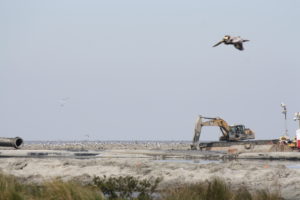
An artificial berm was created on the bay-side of this island and then new substrate was piped in to add sediment- in time plants such as mangroves will colonize the new soil and a marsh will develop.
We know that wetlands around the world face big challenges: fragmentation, pollution, conversion, climate change, etc. But we also know that there are ways to combat these issues, and some of those options give us the chance to get directly involved in wetlands conservation. If you are looking for a way to participate, you’ve got lots of choices-
For learning more about wetlands conservation in general and small actions that can make a difference in the long-term:
- Wetlandprotection.org has a “Wetlands-at-Risk Protection Tool” to help guide communities through the process of making a conservation plan
- Hillsdale County Community Center has information on different wetlands issues
- USDA Natural Resources Conservation Service has easement programs that include efforts for wetlands
- NOAA provides “10 things you can do for coastal wetlands”
- the National Wildlife Federation lobbies for legislation protecting wetland habitat
If you want to contribute to organizations that work at an international level:
- RAMSAR brings together information on a country-by-country basis and seeks to list and protect wetlands of international importance- they also coordinate World Wetlands Day
- Birdlife is involved in conservation efforts that benefit wetland-using birds
- Wetlands International needs volunteers for a variety of projects, including their annual waterbirds count
- you can adopt a pink river dolphin from World Wildlife Fund
- Ducks Unlimited has helped protect over 4 million hectares of wetlands in the Americas- even if you aren’t a hunter, please consider buying a duck stamp– it is estimated that declining numbers of hunters between 1995 and 2008 resulted in $126 million less in duck stamp revenues (Vrtiska et al. 2013), money that would have been used to help protect vital wildlife habitat
For national and regional groups, you have a lot of choices (I’m just providing a small selection- the US EPA even maintains a directory of volunteer monitoring projects for water quality)- you can donate, visit their centers, or volunteer to help with projects:
- Wildfowl and Wetland Trust in the UK
- Fens for the Future in the UK
- National Wetland Trust of New Zealand
- WetlandCare Australia
- Wisconsin Wetlands Association
- YourWetlands in the San Francisco area
- Galveston Bay Foundation
- North Carolina Coastal Federation
- Amphibian and Reptile Conservancy
Given the wide ranging issues facing wetlands around the world, it’s nice to know that we also have a wide range of ways to get involved in protecting these important habitats. Hopefully you find something that sparks your interest- if not, this may be your opportunity to start something new!
Works cited:
Vrtiska, M.P., J.H. Gammonley, L.W. Naylor, and A.H. Raedeke. 2013. Economic and conservation ramifications from the decline of waterfowl hunters. Wildlife Society Bulletin 37:380–388.
